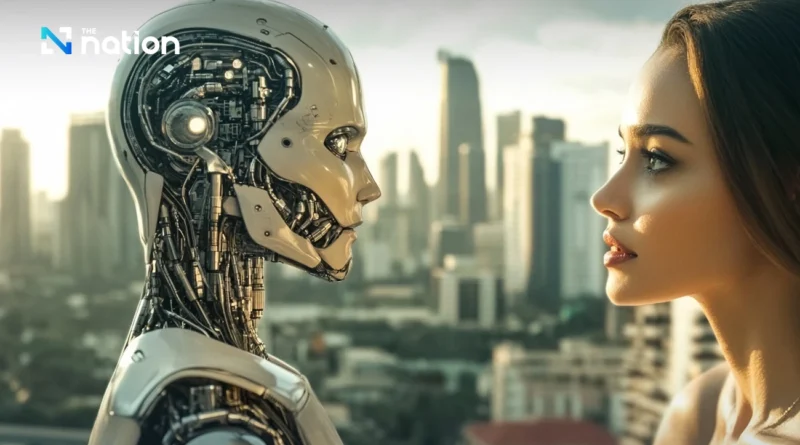AI and Humanity: The New Age
We stand at the juncture of the evolution of humankind—a time when artificial intelligence (AI) is no longer a machine but an agent of transformation, ushering in a new age, remaking us and the world, our living, way of life, and existence. Science fiction turned science fact yesterday. From virtual personal digital assistants on handsets to AI-based diagnoses, artificial intelligence surrounds every aspect of life. But maybe not so much as the fact that it is its influence which heralds the break of dawn of the new age for mankind. Understanding Artificial Intelligence
Artificial Intelligence are computer or machine programs that are able to undertake tasks that would take human intelligence—i.e., problem-solving, reasoning, learning, and decision-making. AI is distinct from other applications in that it gets better with time since it can be trained on data. In other words, it learns to respond to new things, recognize patterns, and make predictions. AI exists in various forms
Narrow AI, to one task like voice recognition (Siri, Alexa) or recommendation software (Netflix, YouTube).
General AI, theoretical and intellectual AI that would likely be capable of anything mentally that we are.
We’re safely in the narrow AI so far, but what’s going on with machine learning and computer processing is heading towards something very interesting and powerful.
How AI Is Changing Our Life
1. Health Transformation
Artificial intelligence is transforming medicine into a quicker, more precise one with more precision and less expense. Applications of AI are quicker than the human eye to interpret medical images, detect early disease signs, and even propose customized treatment regimens. Virtual health assistants and chatbots are freeing patients to be self-sufficient in care and to find answers 24/7.
2. Intelligent Workplaces
AI. It is streamlining tasks in every category but a handful. On factory floors, products are produced by machines. With computers, they predict inventories in finance. With robots, they give easy answers to customer service so the customers get to answer harder questions. AI not only automates but also generates new forms of work in data science, AI ethics, and machine learning engineering.
3. Learning and Education
AI is introducing personalized learning. Adaptive learning technology enables students to learn anything they want, in their own way and at their own pace, and in their own learning style. A student can be individually taught by artificially intelligent tutors, bridging learning gaps and learning as a participative interactive process.
4. Convenience Day in Day out
From smart shopping lists to voice-activated home automation, life only gets simpler with a little bit of help from AI. GPS map applications, language translators, and spam filters all use AI, without us even realizing it.
The Human-AI Partnership
Where others were trembling in their boots about the possibility of AI replacing man in the workplace, the true one is that of AI as a vast human employee. AI is not replacing man but is broadening our capability—to free man from drudgery so that he can further develop his creativity, problem-solving capacity, and emotional quotient.
Physicians know in advance that they will be diagnosing, lawyers wade through papers, and architects create with the aid of AI tools. All these forms of man-machine symbiosis unleash imagination that they would otherwise never have come up with.
Problems and Moral Issues
And yet all this show presents titan challenges:
1. Job Displacement
It will be supplemented with job loss, or more specifically, for repetitive and routine jobs. It would have been required to reskill and upskill workers so that they are not lagging behind human beings.
2. Bias and Fairness
AI learns from data, and biased data means the same is going to be repeated and amplified by AI. That is particularly bad in the scenario of hiring, policing, and lending. AI decision-making must be transparent, fair, and accountable.
3. Privacy and Surveillance
Application of AI in such instances, such as facial recognition and tracking, are privacy issues. Without regulation, this technology would be exploited by the state or corporation to surveil individuals in some covert manner.
4. Autonomy and Control
The more sophisticated the AI systems become, the less one can understand why the AI is doing one thing and not another. The “black box” is a secret. And then there is the question: who is to blame if an AI suggests a fatal flaw—a programmer, an entity, or the hardware?
The Future of AI and Humanity
We are just starting the AI revolution. We are making decisions today that determine how tomorrow’s AI in society is built. International cooperation, ethics, and global development must guide this revolution.
Governments, companies, and people must come together and make sure that AI is being utilized for the welfare of the whole human society in the world and not just the wealthy class. Transparency, human oversight, and a proper regulation framework must exist so people can trust AI systems.
The largest question, therefore, is not so much what we are able to do with AI—but what we wish to do with it. Do we apply it to fix problems of the world like climate change, poverty, and sickness? Or do we apply it to fuel inequality and polarisation?
Conclusion
The AI age is the start of an age where a miraculously marvelous but complex age is just beginning. Just as it was not to be played around with like some device that would organize civilization and destiny using fire, electricity, or telecommunication, AI is not to be played around with. AI can make life improve and improve, get healthier, safer, wiser, and more productive—provided AI itself is allowed to be wise, ethical, and human.
As we go into this new world, never forget the reality that technology exists to serve human beings and not to trap them. What the future holds for artificial intelligence, we have yet to script, and we all are scripting how the book is being read.
